Institutional Context
Summary
King’s is a world-leading university dedicated to finding solutions to urgent global challenges through our teaching, research and collective impact.
A civic university at the heart of London, we have five main campuses across the capital, with three co-located alongside major NHS hospitals, together with sites in Oxfordshire and Cornwall.
We are a research-intensive, multi-faculty university with a diverse range of subjects and disciplines, employing >9,000 staff and have >33,000 students, with an annual income of c.£1.15bn.
Our diverse and inclusive community of students, staff and alumni comes from across London, the UK and >150 countries around the world, and we are ranked 5th in England by the Times Higher Education World University Rankings (2023).
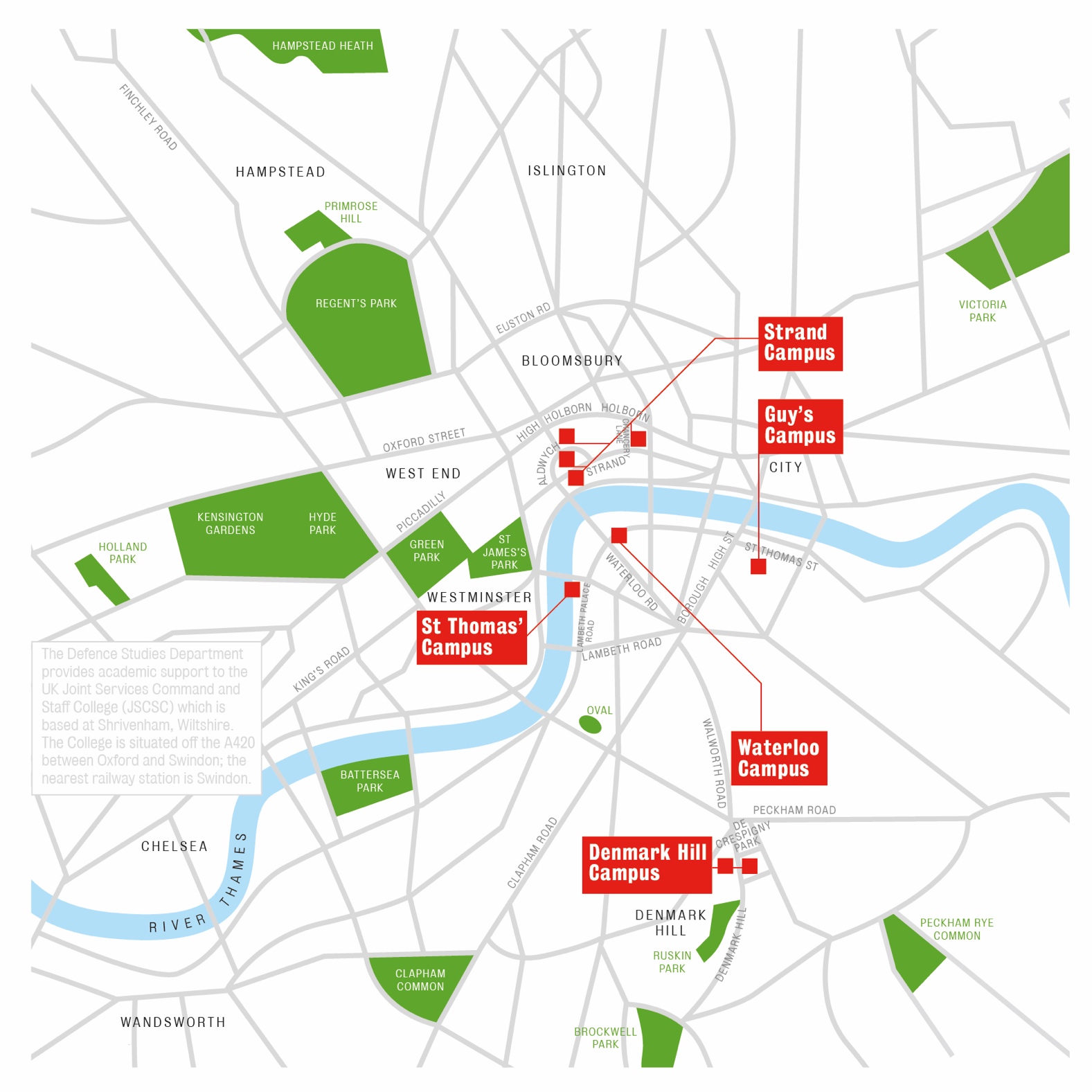
Institutional context
King's Strategic Vision 2029 sets out bold ambitions for the future of King’s as we look towards our 200th anniversary: to make the world a better place through our excellence in education, research and our service to society.
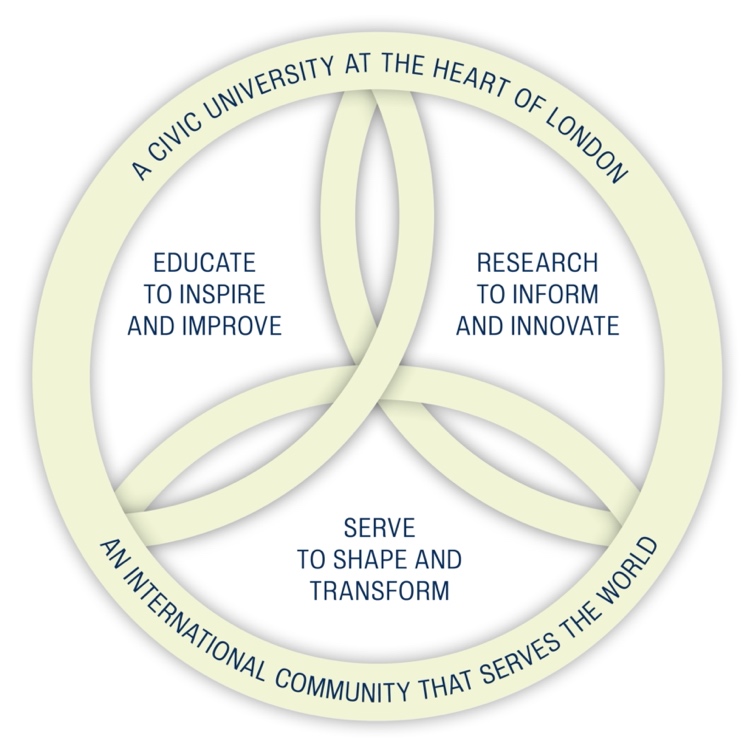
Central to these ambitions is our commitment to working in partnership to respond to local, national and global priorities and challenges (see Fig. 2). A major part of this is collaboration and co-creation with communities across London, within the boroughs our campuses are based, and in Cornwall which is home to King’s Service Centre.
King’s education and research portfolio extends from world-class health and biomedical activity, to internationally-prestigious arts, humanities, social sciences and law; alongside major investment and growth in engineering and natural/mathematical sciences.
Through our commitments to the United Nations Sustainable Development Goals (UN SDGs) and by embedding sustainability into our teaching, partnerships, impact and operations, we are supporting the worldwide effort to build a better future for our people and planet.
Our Knowledge Exchange and Innovation Ecosystem (Fig. 3) aligns academic priorities with professional services expertise, physical infrastructure, and impact funding. Key components include:
Innovation@King’s unifying expertise in commercialisation, industry partnerships and translational research.
King’s Entrepreneurship Institute supporting entrepreneurial thinking, skills and action among students, staff and alumni.
King’s Policy Institute connecting research to policy and responding to society’s challenges with evidence and expertise.
King’s Culture drawing together artists and cultural partners with students, staff and alumni to drive innovation and insight through arts and culture. Science Gallery London is our flagship public space for students, staff and local communities.
King’s Health Partners (KHP) connects King’s with three leading NHS Trusts through an NIHR/NHS England-accredited Academic Health Science Centre. SC1 is a Life Sciences Innovation District that brings together KHP with local councils to foster public-private partnerships and develop equitable solutions to society’s complex healthcare challenges.
Partnerships with Government including the Strand Group, Global Institute for Women’s Leadership and King’s Global Health Partners to influence societal change.
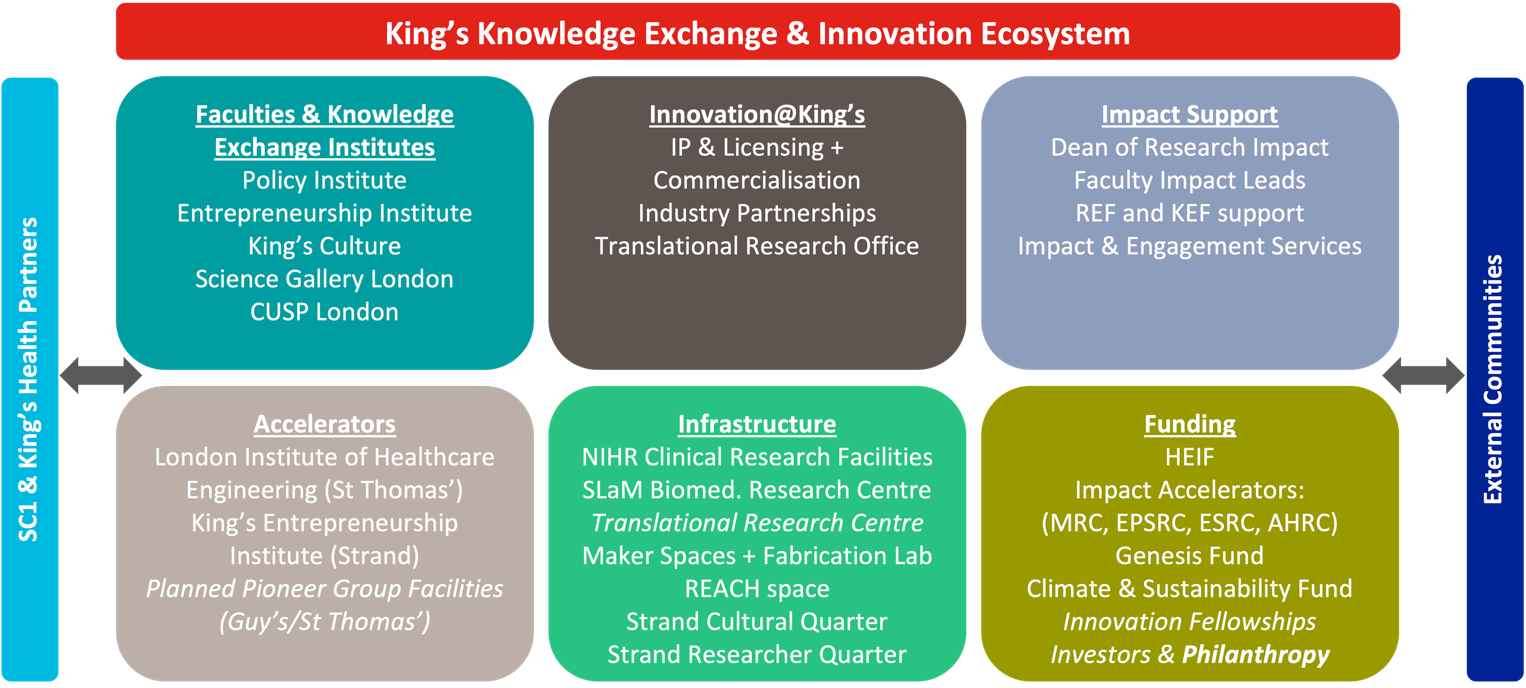
Figure 3: King's Knowledge Exchange and Innovation ecosystem aligns our expertise
with infrastructure and funding to deliver impact
King’s commitment to a capital-wide, hyperlocal focus with our home boroughs is set out in King’s Civic Charter and bespoke statements of intent with Lambeth, Southwark and Westminster. We work in close partnership with councils, charities and civic organisations to respond collaboratively to local societal challenges.
This work is strengthened by “clusters” connecting the university, industry and other partners, including the NHS, to enhance knowledge exchange. Working with local authorities and investors, we have developed hubs for MedTech (St Thomas’), Biomedical Science (Guy’s), Neuroscience & Mental Health (Denmark Hill), and digital, social, creative, business (Strand) bolstered by industry partnerships with Siemens Healthineers, Medtronic, Nvidia, GSK, UCB, Unilever, SMEs in cell therapy, MedTech/AI and more.
Our knowledge exchange is delivering real-world impact demonstrated by our 3rd place ranking for impact amongst multi-disciplinary universities in REF2021 and 4th place in England in the Times Higher Education Impact Rankings (2022).
|
|
|
|
|---|---|---|---|
|
|
|
|
|
|
|
|
|
|
|
|
|
|
|
|
|
|
|
|
|
|
|
|
|
|
|
|
|
|
|
|
|
|
|
|
|
|
|
|
Abbreviations table
For further information, please send queries to KnowledgeExchange@kcl.ac.uk
Local Growth and Regeneration
Summary of approach
King’s Vision 2029 makes Service an equal part of our academic mission, alongside Education and Research. We strive to go beyond what might be expected of a university to serve, shape and transform local communities and societies through teaching, research, operations and actions.
Our partnerships are essential to delivering these commitments as they are built on collaboration and co-creation to facilitate positive change. We bring together three leading NHS Foundation Trusts through King’s Health Partners, and work closely with local communities and Councils in our home boroughs of Lambeth, Southwark and Westminster and King’s Service Centre in Cornwall.
Our accelerators provide SMEs, start-ups and spinouts access to our rich translational ecosystem connecting academia, industry and the NHS.
Aspect 1: Strategy
King’s Vision 2029, was developed following consultation with all members of the King’s community; local communities, authorities and businesses. It sets out our ambition to be a civic university at the heart of London, working in partnership to contribute to the success of the city in which we make our home. We deliver both capital-wide activity and a honed focus on King’s ‘home’ boroughs of Lambeth, Southwark and Westminster. Through the King’s Civic Charter and bespoke Statements of Intent with our three home boroughs, we seek to challenge inequality, build capacity and grow resilience within our local communities.
Service embodies King’s commitment to social impact and societal change, at home in London, across the UK and around the world. Through our teaching, research, and targeted initiatives, such as Civic Challenge, London Venture Crawl and prioritising procurement from local businesses, we contribute to London’s long-term prosperity and growth.
Alongside our commitment to London, King's Service Centre plays a key part in both the life of King’s and the local community in Cornwall by providing professional services support to our students and staff and bringing high-skilled career opportunities and training to Cornwall. We are developing partnerships to meet the needs of local communities and develop mutually beneficial initiatives.
We have committed to strengthening the impact of our research through enhanced support and engagement to accelerate social and economic benefit to the communities we serve in London, the UK and globally through equitable partnerships.
We bring together three leading NHS Foundation Trusts – Guy's and St Thomas', King's College Hospital and South London and Maudsley – through King’s Health Partners (KHP) to contribute to the health and wellbeing of local residents and by providing training and skills development to healthcare workers.
King’s, with KHP, have developed a strategy to cultivate an environment where start-ups and SMEs can flourish, bringing innovation in translational research rapidly to market, and where we can partner with multinational companies to accelerate product development and evaluation. This will enhance research, create skilled jobs, attract investment and improve the health and lives of people in our local communities and across the capital.
KHP is now building on the strength of our partnerships with Lambeth, Southwark and the Guy’s & St Thomas’ Foundation through a major strategic initiative to build SC1 – London's Life Sciences Innovation District. SC1 will be a world-recognised ecosystem for transformative innovation with health equity at its heart. It seeks to foster public-private partnerships to develop solutions to society’s complex healthcare challenges.
Aspect 2: Activity
By using our knowledge with purpose and co-creating new knowledge in partnership, we can benefit all our communities and develop life-changing ideas with local impact and global relevance. Examples include:
Meeting the needs of our local areas
As part of our commitment to King’s home boroughs we have signed statements of intent with Lambeth, Westminster, and Southwark outlining areas for collaboration and mutual priorities, informed by each organisation’s strategic ambitions and strengths. This provides a framework for King’s students, staff and alumni to work with local communities and residents to co-create solutions to shared problems and challenges.
We have worked residents of Lambeth, Southwark and Westminster using peer research, photo diaries and deliberative workshops to understand the lived experience of the cost of living crisis and co-create policy interventions. These are now underpinning the local authorities’ strategy and decision making.
Our City, Our Future: Masters students from King’s Business School co-designed a peer researcher project with the Young Westminster Foundation to identify the needs of young people in Westminster. The report produced identified the top 3 political/social issues facing young people in Westminster as Covid-19, Crime & Safety and Tackling Racism.
Building Better Futures: Following a listening exercise engaging over 700 local Lambeth residents, a report was published with recommendations to inform a social mobility action plan being co-produced between King’s, Lambeth Citizens and Lambeth Council. This work will help to break down barriers to achievement for local young people.
King’s Civic Challenge invites participants to work together to develop collaborative and creative solutions to issues identified by communities in Lambeth, Southwark and Westminster. Winning projects were awarded £5k, an evaluation package and ongoing coaching to help make their projects more impactful.
Economic growth
Our focus on knowledge exchange is demonstrated through our hosting of MedCity (connecting industry and universities across London), leadership of Research England’s UK Advanced Therapies (with dedicated SME engagement funding), and leadership of the Innovate UK London AI Centre for Value-Based Healthcare (4 universities, 11 NHS Trusts, 6 industry partners and 11 SMEs). King’s are also supporting and collaborating with local businesses with free consultancy services from our students.
King’s has a commitment to socially responsible procurement, guided by our sector-leading policy on local procurement. For instance we worked with local social enterprises and suppliers to produce thousands of reusable face coverings for staff and students returning to campus following the pandemic. King’s also helped to establish a social fund with the first projects funded in our home boroughs through King’s Civic Challenge.
King's Service Centre in Cornwall is home to an innovative and forward-thinking team of professional services staff. We have recruited over 200 local colleagues, invested in the training and development of staff and created Graduate and Apprenticeship opportunities. We are also developing Cornwall’s Digital and IT future talent by working with Cornwall College, local schools and businesses to offer personal and professional growth to local people.
King’s has been working with the Centre for London to monitor the impact of Covid on London, tracking impacts on the labour market, air pollution, the economy and society. King’s is also a partner in the Productivity Institute to improve productivity and economic recovery in London and the South.
SC1 brings together seven partners with over a century of healthcare innovation history, and a shared purpose of tackling the lack of health equity, to put life sciences at the heart of London’s ecosystem.
SC1 is underpinned by four strategic pillars that anchor its vision. These include 1. Entrepreneurship Enterprise and becoming the ‘go to’ ecosystem for start-ups, entrepreneurs and SMEs; 2. Partnership - providing a framework and synergistic fit for BioPharma, Big Tech and the investment community; 3. Employment & Skills focusing on leveraging local talent; and 4. Real Estate across the three Innovation Hubs that provides the space to realise this unique vision.
The London Institute of Healthcare Engineering (LIHE) brings together King’s research excellence, Guy's and St Thomas' NHS Foundation Trust’s leading clinical practice and the MedTech sector’s commercial innovation power and talent to engage multinationals, SMEs and start-ups. The close collaboration will ensure that research in healthcare engineering is translated rapidly into new products and technologies that will benefit patients.
King’s has invested £15m towards the construction of the LIHE building with further investments in support for innovation and enterprise, including a new Accelerator. This builds on our existing 12-month Accelerator programme King’s20 supporting the 20 highest potential ventures across King’s, providing them with training and mentoring, access to desk space, investors and internal funding. We have a partnership with Santander to improve EDI in entrepreneurship, focusing on Women Entrepreneurs and students from underrepresented groups.
Our Joint Venture with our two NHS Trust partners, KHP Ventures, offers equity investments with healthcare expertise for ground-breaking MedTech and digital start-ups to improve health and healthcare.
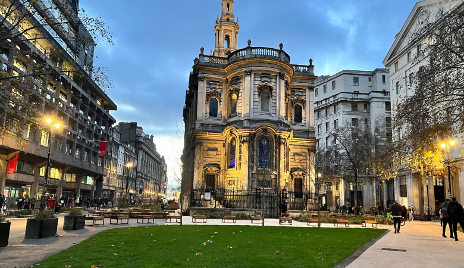
Figure 1: Pedestrianisation of the Strand-Aldwych has created London's largest new public space for a decade
The £22m Strand-Aldwych redevelopment (Fig. 1) has transformed one of the capital’s most congested and polluted streets into a green and tranquil space the size of a football pitch for King’s and the community to enjoy. King’s colleagues were involved in the co-design process with partners including Somerset House Trust, Courtauld Institute of Art, Northbank BID and Westminster City Council. The new space provides opportunities for education and informal learning for students and local communities and visitors, while facilitating closer relationships between cultural neighbours and partners across Westminster. This builds on our new landmark 10-year strategic relationship with The Courtauld Institute to achieve educational, intellectual and public benefits together.
The Centre for Urban Science and Progress (CUSP) London, is based at King's bringing together researchers, businesses, local authorities and government agencies to conduct interdisciplinary research and innovation using Data Science in and for London. CUSP formed an urban science partnership with Westminster City Council for the redevelopment of Strand-Aldwych, advising on how King’s could assist and benefit from the pedestrianisation, as well as integrating several MSc student projects in the process.
Social impact
King’s ethos of serving society is demonstrated through King’s Volunteering, which connects students and staff with an organisation or cause to make a positive difference. Our online volunteering platform also enables community organisations to access King’s to enhance the impact of their work.
King’s Service Time supports and enables colleagues to undertake community activity beyond the university. It offers King’s staff up to three days/year to take part in voluntary work for another organisation or volunteering programme.
King’s Global Day of Service on 25 March (to celebrate the day King’s was founded) sees King’s students, staff and alumni come together across the world to volunteer their knowledge, skills and experiences to give back and drive positive change (Fig. 2).
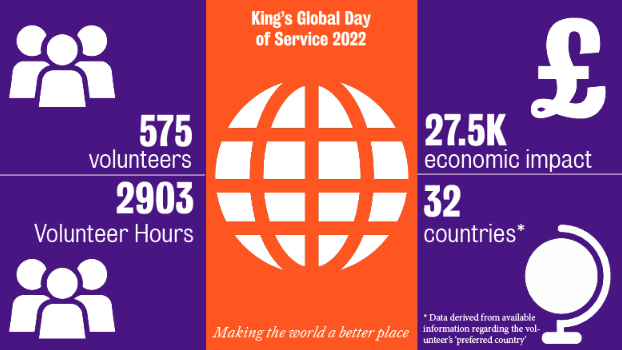
The Legal Clinic is a free, first-tier advice service offering advice on a wide range of legal issues. King’s students work under the supervision of lawyers to provide vital pro bono advice to the public. The Windrush Justice Clinic, is a collaborative partnership made up of community organisations, law centres and university legal advice clinics striving to help victims of the Windrush scandal receive the compensation they deserve. The scheme has directly benefitted the community affected with over 100 clients being assisted to claim Home Office compensation, with 20 being awarded over £1m.
King’s has taken a whole-university approach to forced displacement through our Sanctuary programme to support sanctuary-seekers to rebuild their lives and fulfil their potential through a range of innovative programmes. Kings has worked in partnership to develop the University Sponsorship Model to enable implementation of the UK Government's Homes for Ukraine scheme. This has allowed us to respond to a global issue with local support, becoming recognised by Citizen’s UK as the UK’s first “Refugees Welcome University.”
King's College London Mathematics School provides high quality maths education to year 12 and 13 students with a particular aptitude and enthusiasm for maths, widening participation in mathematical degrees and careers. The award-winning school runs outreach activities in maths and physics for pupils in years 7 to 13 and supports teachers with a programme of Continuing Professional Development.
King’s experts were among the partners alongside residents, businesses and community groups to develop Lambeth’s Climate Action Plan. The Plan will make Lambeth a cleaner and healthier place to live, work and visit. King’s is also part of the group of high-profile organisations brought together by Lambeth Council in the Climate Partnership Group to lead delivery of the action in sectors ranging from higher education to housing.
The Ortus public café and conferencing space is a hive of activity for local families, researchers and clinicians with the collective goal to improve child and adolescent mental health services. It’s a model of collaboration which has informed the development of the Pears Maudsley Centre for Children and Young People, which similarly brings together King’s College London, South London and Maudsley NHS Foundation Trust, and the Maudsley Charity to accelerate research translation into practical treatments to benefit young people. By involving young service users and their families in the design, we ensured the building provides age-appropriate spaces and works hard to ease anxiety.
As part of the King’s Civic Challenge 21/22, charity partner Coin Street Community Builders and researchers from the Wellcome/EPSRC Centre for Medical Engineering (CME) worked collaboratively to address a community challenge identified by the charity partner in North Southwark. The project builds social inclusion of isolated and underserved communities in deprived areas locally, rejuvenating a potential revenue stream through gym memberships and skills development with payment for young people through the project.
REACH (Resilience, Ethnicity, and AdolesCent Mental Health) is an ongoing cohort study of adolescent mental health in Southwark and Lambeth. The study is taking place in 12 secondary schools in South London, with over 4,000 Year 7 to 9 pupils invited to take part since 2016. A series of new reports from the study highlight the impact of the COVID-19 pandemic on the mental health of young people in south London.
Aspect 3: Results
An independent economic analysis of King’s research and knowledge exchange activities in 2020-21, showed that King’s generated a total of £2,281m economic impact (Fig. 3) with £274m economic impact in London, and significant impact of £26 million in the south-west of the UK, corresponding to our site in Cornwall. In 2020-21, King’s spinouts secured £245m in equity (Beauhurst & Parkhurst 2022) and approximately £62m of investments have been raised to support King’s start-ups, with 600 jobs created (HE-BCIS, Beauhurst).
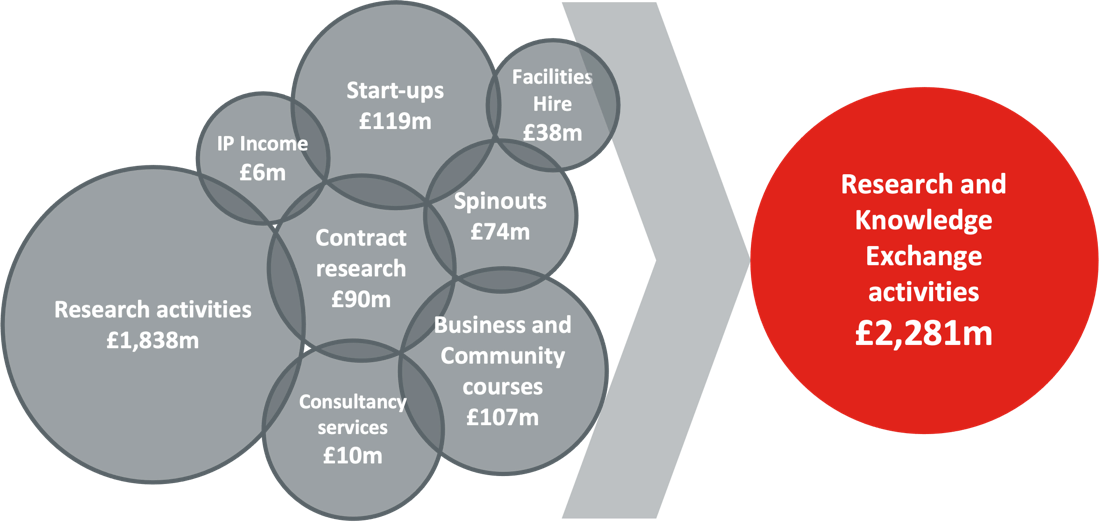
Figure 3: Economic impact of King’s knowledge exchange and research activities 2020-21(London Economics)
King's ranked among the top five UK universities for environmental and social impact in the 2022 THE Impact Rankings. Several of our projects and initiatives have annual impact reports to share outcomes and impact with partner organisations and communities:
The Legal Clinic Annual Report shows the progress made towards the promotion of social justice and provision of free legal advice with positive feedback from students and clients (Fig. 4).
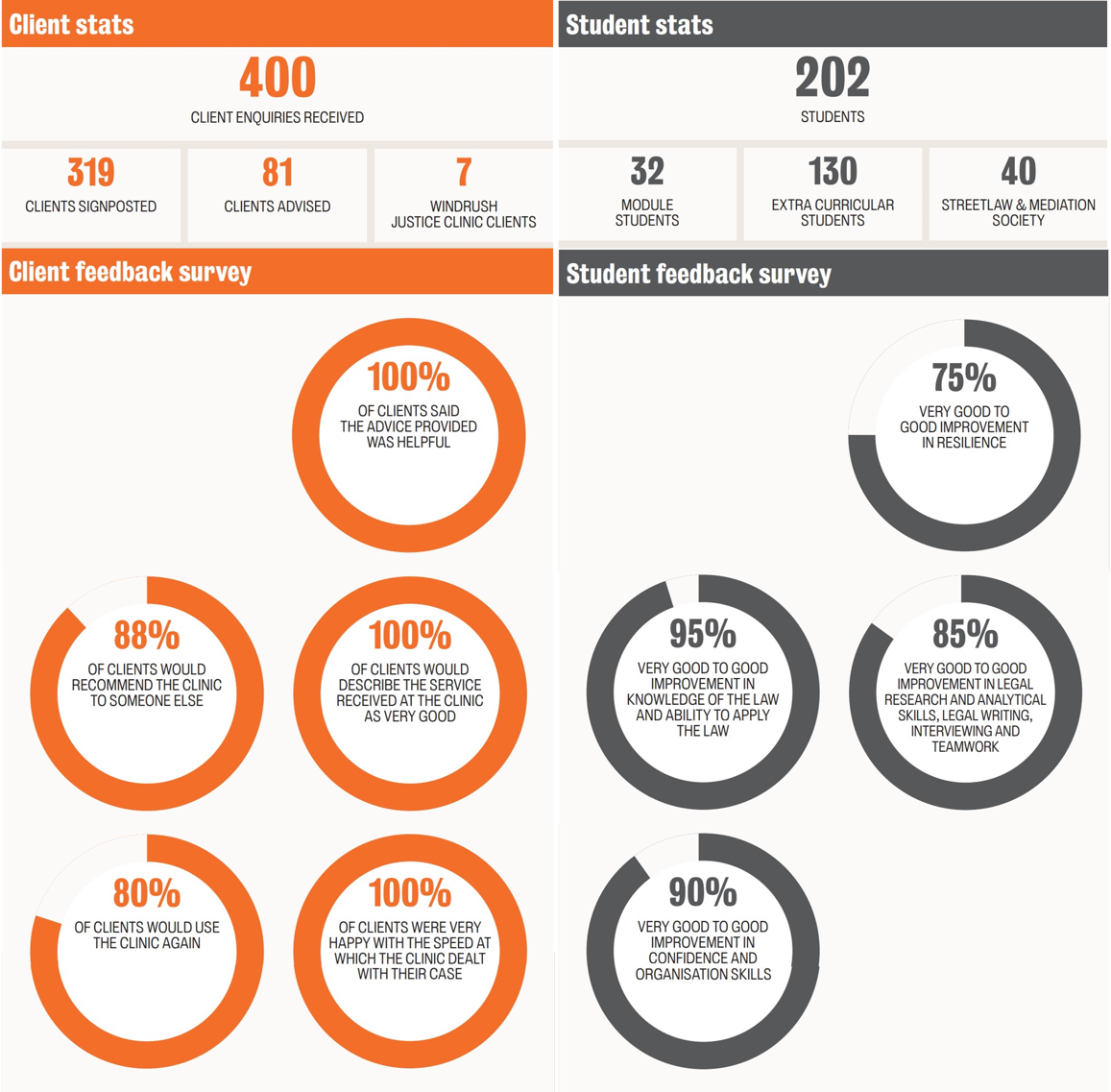
Figure 4: Positive feedback from students & clients using King's Legal Clinic and how it has benefitted them (2021-22)
The King’s Health Partners (Impact report, 2021-22) shows through our partnership with KHP, we have received over £200m investment in our novel technologies, therapeutics, and diagnostics. Targeted support has been implemented to address health inequalities across the six south-east London boroughs for place-based collaborative proposals.
Our Entrepreneurship Institute impact report highlights the success of their activities, including the Cohort VI Ventures’ outcomes following completion of the 12-month King’s20 Accelerator programme (Table 1).
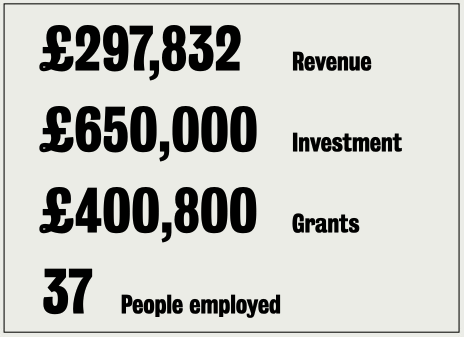
The Health & Social Care Workforce Research Unit Annual Report 2020-2021 outlines the unit’s tremendous contribution to research, policy and practice in health and social care workforce topics during the pandemic. This includes a programme to support day services in South London with new evidence and to develop capacity to improve services: Mapping And Community Engagement.
Most importantly, our local partners value the contribution King’s makes to our partnerships and delivering our mutual goals for our local communities. This value is determined from ongoing feedback we receive via community representation on advisory boards and forums such as:
The CME have established a Community Advisory Forum comprising of community members and organisations based in Lambeth and Southwark. The Forum advise on the new Community Engagement Fund with some members taking part in the review panel to assess submitted proposals.
Our ESRC Centre for Society and Mental Health (CSMH) have developed a Lived Experience Advisory Board (LEAB) to inform the direction of Centre research programmes, consulting on and benefitting specific research projects. Through the NIHR Maudsley BRC we have several service user advisory groups to improve our research by including patient perspectives.
King’s is committed to achieving the UN Sustainable Development Goals and will continue to use our knowledge with purpose to use our expertise for social and economic benefit and to make the world a better place.
Public & Community Engagement
Summary of approach
King's Strategic Vision 2029 sets out bold ambitions for the future of King’s as we look towards our 200th anniversary: to make the world a better place through our excellence in education, research and our service to society.
We enhance our impact by building on successful models that integrate Research, Education, Service and engagement. Community engagement is embedded into our degree programmes connecting students and teachers with community partners. We have embedded public and community engagement (P&CE) within our research development pipeline and work alongside communities to respond to issues that they have identified of concern.
Our engagement activities focus on our communities and stakeholders locally, nationally and internationally to inform change across the UK and at a global scale.
Aspect 1: Strategy
Our strategic vision for P&CE with research at King’s is:
“to improve the quality, relevance and impact of King’s research to society through meaningful public and community engagement and involvement.”
We deliver this vision through a set of objectives to build on our existing partnerships, nurture new collaborations to meet the needs of our communities, and become a more open and accessible institution. Our approach was developed with a range of internal and external stakeholders to create a set of principles to ensure we are inclusive, diverse and responsive to the needs of our communities.
Our London location allows King’s to work with its diverse populations (Fig. 1) and we have dedicated pathways to capture their thoughts and views. The way in which we identify and respond to our communities’ needs is included in our Local Growth and Regeneration narrative.
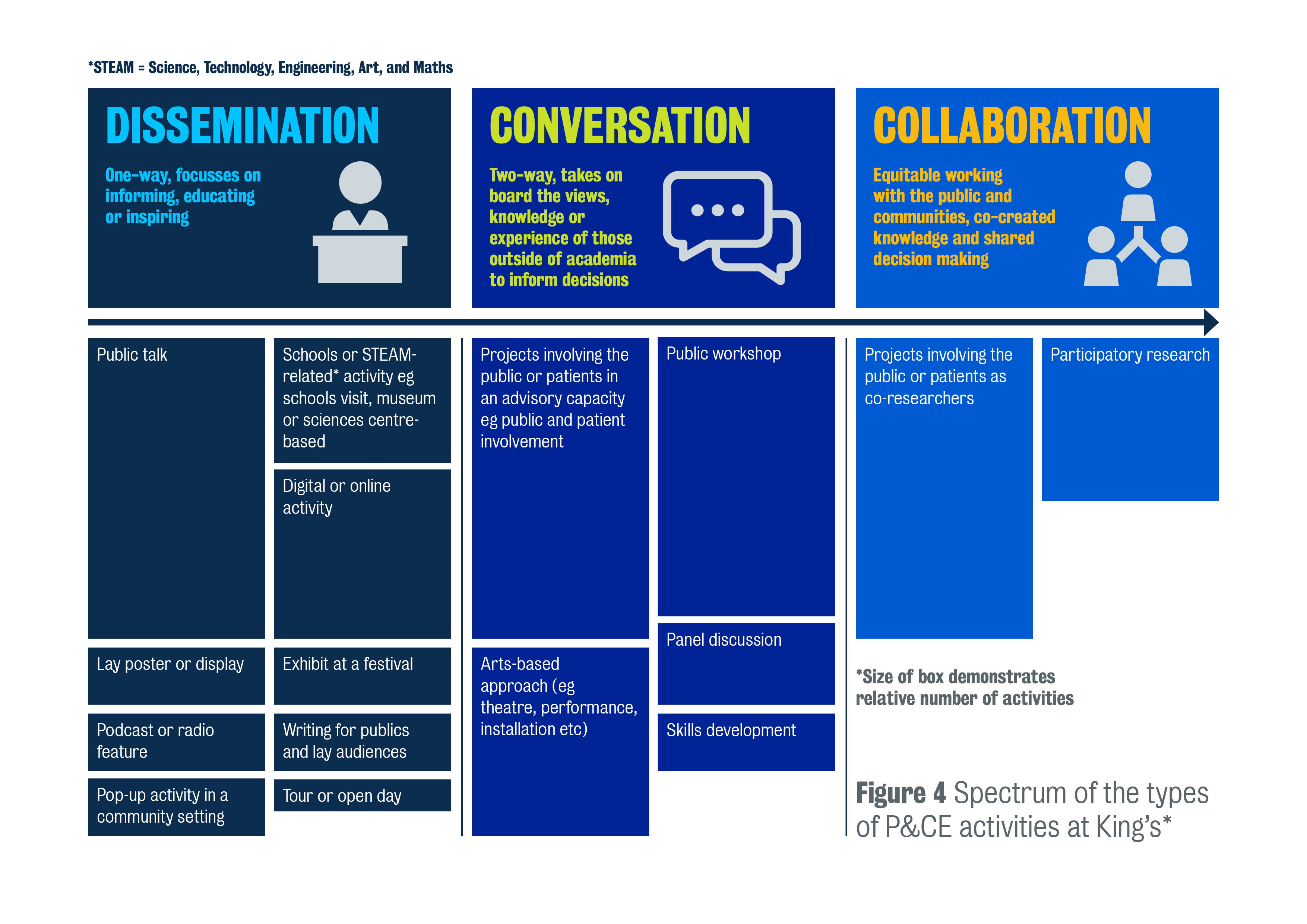
Our first P&CE Objective is to deliver P&CE across our Vision 2029 institutional priorities (outlined in our Institutional context), and build on our strengths in Patient and Public Involvement (PPI) through our NHS Trust Partnerships with King’s Health Partners (KHP), arts and cultural engagement through King’s Culture and policy engagement through the Policy Institute. Our dedication to Service to society and flagship public space, Science Gallery London combined with these strengths gives us a uniquely King’s approach to P&CE.
P&CE utilises the specialised expertise we have in our faculties and directorates, building on the long-term relationships held there, with coordination and support provided centrally (Aspect 2), funded by King’s directly or through the HEIF. Additional value for money is ensured through external investment to allow specialist support for specific programmes and activities. This includes P&CE-specific awards of £840k for the Wellcome/EPSRC Centre for Medical Engineering (CME) and £138k for the ESRC Centre for Society and Mental Health (CSMH).
We have joined up Academic leadership through our Vice President (Research & Innovation), and Vice President (International, Engagement & Service), with further leadership provided by our Dean of Research Impact, working with faculties through their academic leads. Governance is provided through our KE, Innovation and Impact Board which reports directly into our University Executive.
Aspect 2: Support
Advice and consultancy for staff, students and external partners is provided through our P&CE practitioners brokering access to our target groups. Our webpages house resources and case studies and we promote sharing of learning and best practice through networks, seminars and lunch and learn sessions.
Many of our health-focused research centres and studies have a strong engagement component, supported through access to a variety of different PPI, charity and advocacy groups, with which research priorities are identified to co-produce.
A proportion of our activities are arts-based using innovative and creative approaches to engagement. King’s Culture through its Science Gallery London and Strand Cultural Quarter provides gateways to cultural organisations and artists to advance research and learning, engage public audiences and add value to the cultural sector.
Practical Support
P&CE support (Fig. 2) is centrally coordinated and locally delivered to maximise the specialist PPI, cultural, policy and community engagement support we have to meet our P&CE strategic support objective.
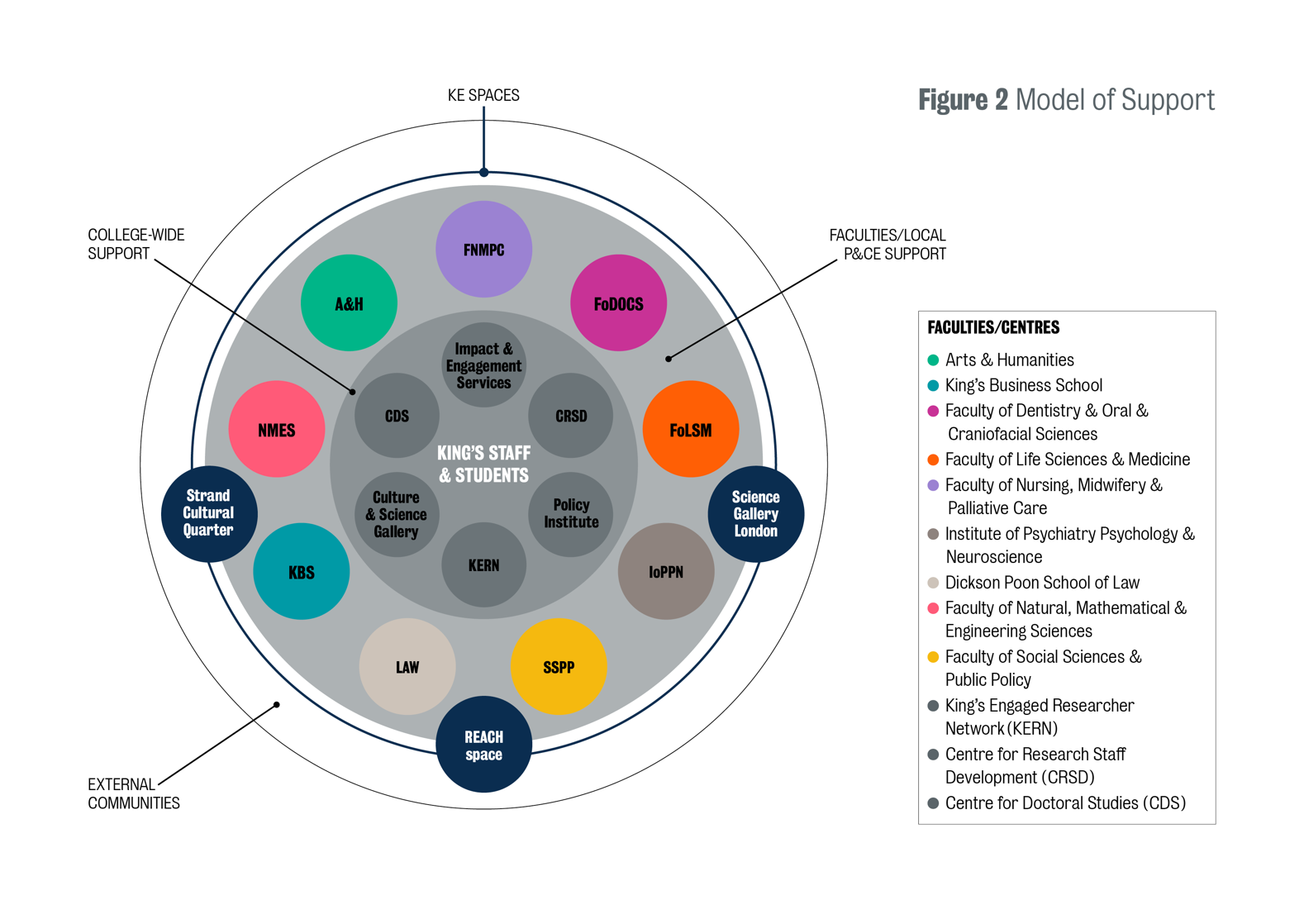
Most support is project-focused and project-funded with a smaller team to provide central coordination and training. This model allows a balance between meeting the needs of a diverse university with providing core skills and support and ensures we work with our partners in a joined-up way across the university. Teams include:
King’s Engaged Researcher Network (KERN) brings together King’s staff and students interested in engaging different audiences. The monthly newsletters reaches >745 subscribers, highlighting funding and training opportunities and sharing best practice. Other networks supporting the delivery of P&CE activities, include the Sustainability Champions and the Race Equality Networks.
Impact & Engagement Services (IES) provides university-wide support to researchers in need of advice and guidance on incorporating high-quality, high-impact public engagement plans into research grant applications (Fig. 3).
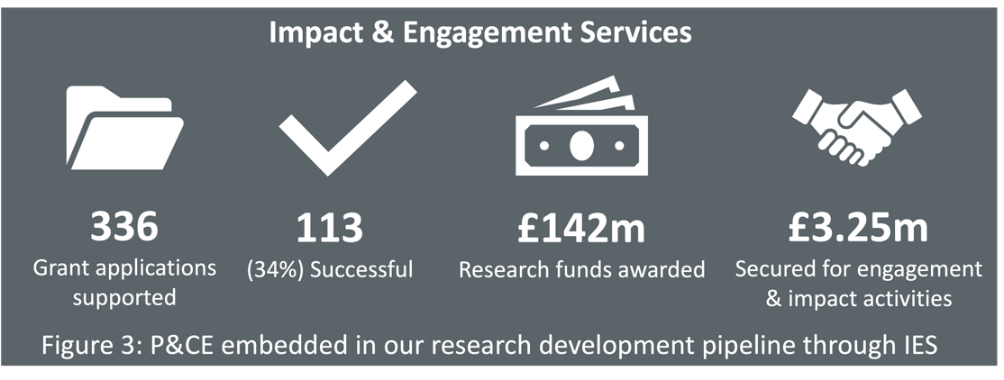
The Policy Institute facilitates engagement between the public, academic, business and policy communities to translate academic research into policy and practice. They run policy labs to provide direct contact with policymakers, providing a valuable opportunity to co-produce responses to complex policy challenges. The approach has been used in many policy areas, including supporting the Independent Review of the Mental Health Act.
Knowledge exchange spaces
We use many parts of our estate to host events and activities with the following dedicated spaces.
The fully-accessible and free-to-visit Science Gallery London showcases work by researchers, students, local communities and artists, hosting free workshops, events and exhibitions. To date it has presented five exhibitions, engaging 200 academics, 3,700 students and welcoming over 150,000 members of the public.
The Strand Cultural Quarter includes the Inigo Rooms, the Exchange, and the Arcade at the Strand campus to support creative learning, showcasing imaginative research collaborations and invites local communities to connect with King’s.
The REACH Space provides a platform for interdisciplinary and external collaborations to explore novel and creative methods, activities and ideas to build more robust and dynamic socially-engaged research.
Skills and training
Skills building and training provision reflects our diverse staff and student needs with beginner to advanced-level training workshops, training on working with particular audiences, podcasts and summer schools. Creative digital skills training has been provided to >1800 students.
KERN Training sessions have been attended by 222 researchers since September 2019. To increase opportunities for learning and sharing of best practice, the KERN has also run a successful Public Engagement at King’s Seminar Series.
Funding
King’s has various grants to enable P&CE activity, including:
Small P&CE grants schemes: Over this KEF period the scheme has awarded >£44,000 to 55 activities (30 staff and 25 research students).
Artist in Residence Schemes: Awarded >£70,000 for £ £5,000 of seed-funding to potential artist-researcher teams to connect, develop and test ideas.
Reward & Recognition
Our academic performance frameworks include ‘Knowledge Dissemination and Impact’. P&CE has contributed to academic promotions and we appointed a Professor of Practice in Public Understanding of Mental Health Research in 2022.
Several faculties and directorates have P&CE and impact awards.
BRC in the Community: is an annual event run by the NIHR Maudsley Biomedical Research Centre (BRC) to showcase and celebrate collaborations between the Centre and its’ community.
Two of our seven principles for P&CE focus on EDI to ensure our offer is sensitive to the needs of our diverse communities. Examples of EDI embedded in P&CE include:
King’s partner NIHR Applied Research Collaboration (ARC) South London
Healthy Eating & Active Lifestyles for Diabetes (‘HEAL-D’) is a co-produced culturally tailored diabetes self-management programme for adults of African and Caribbean heritage.
Aspect 3: Activity
A wide breadth and depth of activities are undertaken to meet the needs of our diverse London audience and fulfil the range of purposes our activities have. These activities cover the full spectrum of P&CE (Fig. 4), ranging from one-off activities and citizen science through to co-creation with long-standing partners resulting in policy change and impactful research.
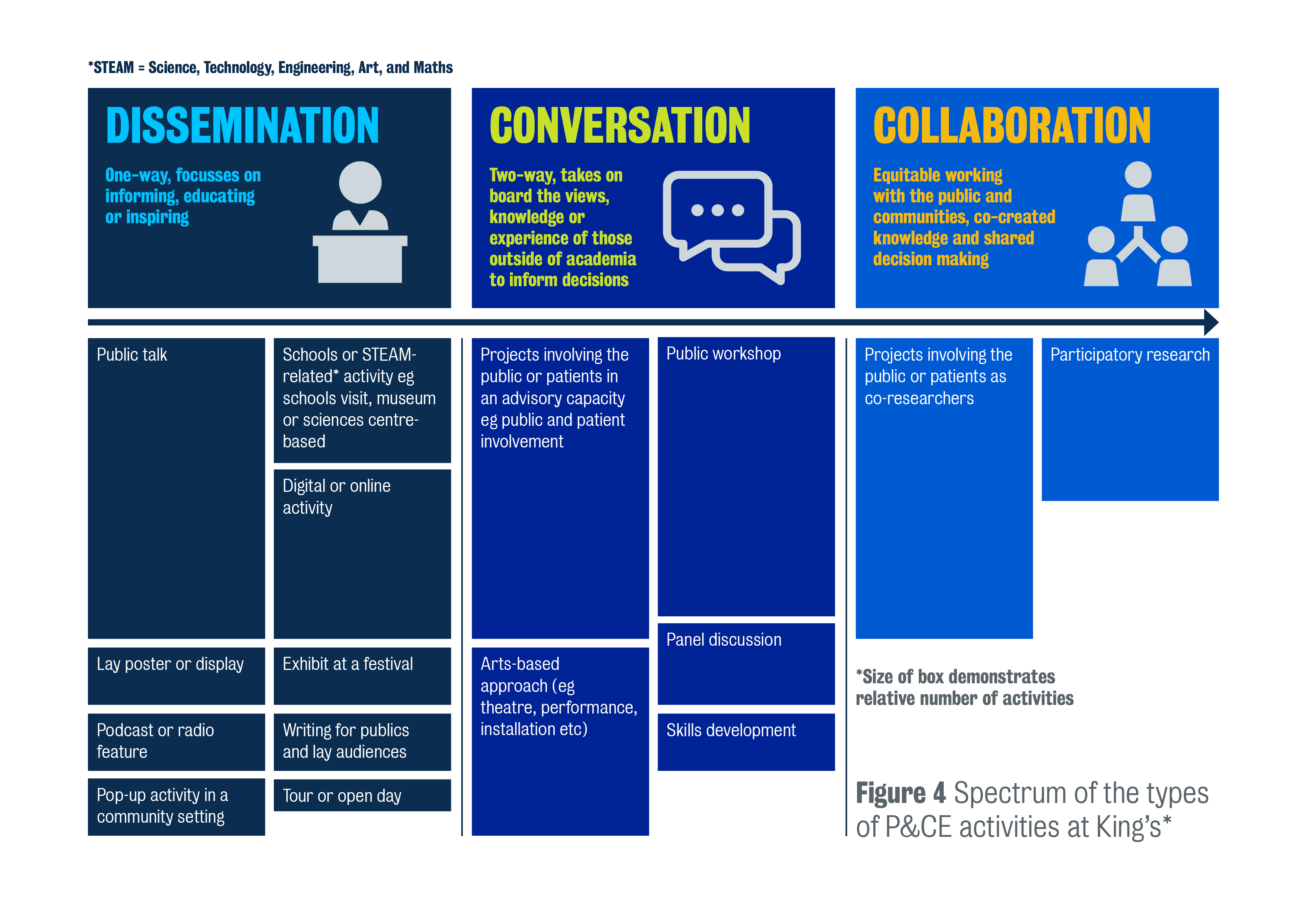
We deliver activities for a range of outcomes (Fig. 5), using critical reflection to enhance our practice and ensuring we meet our strategic P&CE objective, “to meet the different needs of our communities internally and externally.”
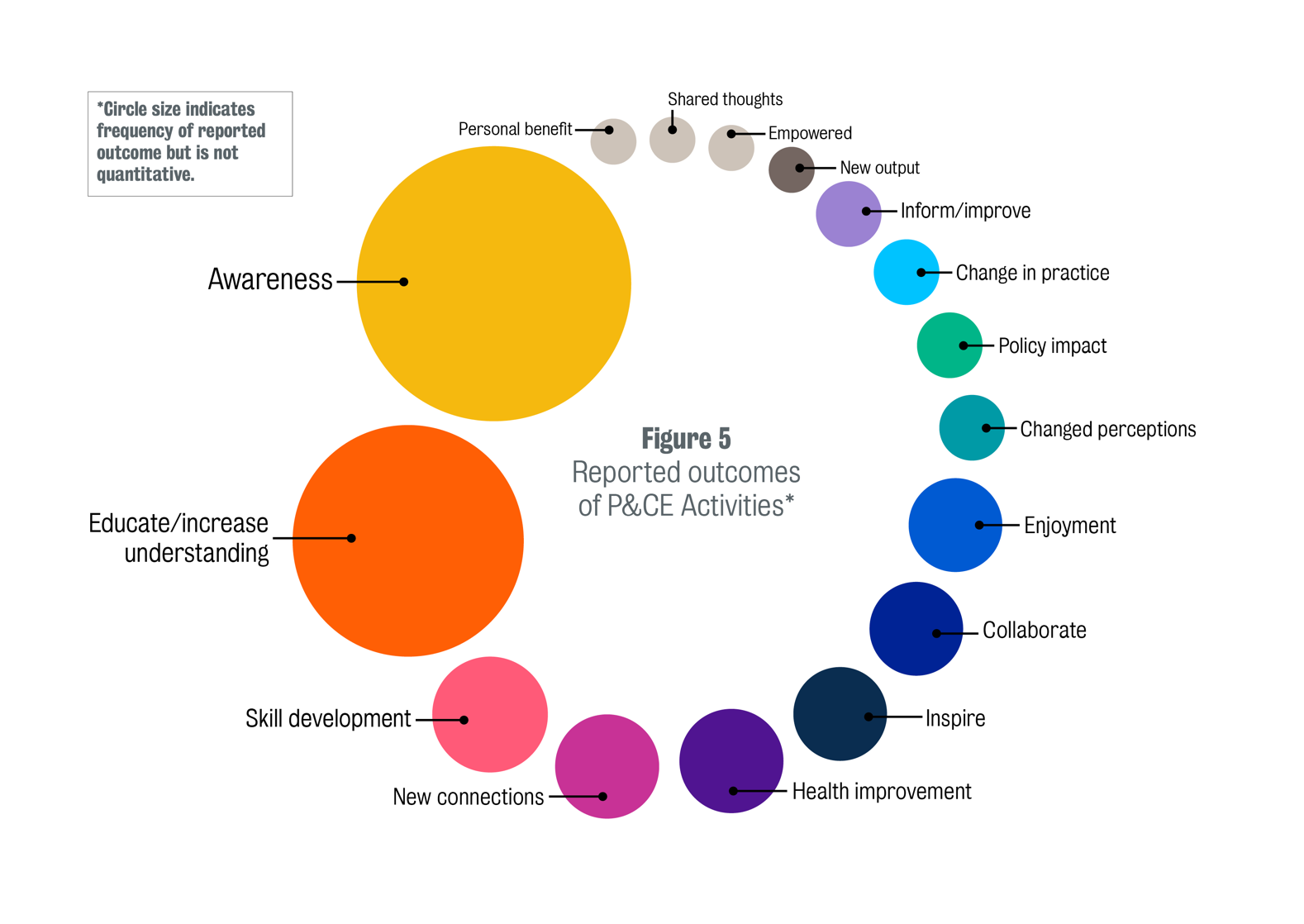
Our engagement activities focus on our communities and stakeholders locally, nationally and internationally in-accordance with our P&CE objective to “Build on and nurture our existing expertise and utilise our long-term partnerships with local, national and international communities and organisations,” as shown in the examples below:
Local
Dental students run The Smile Society to raise oral health awareness, including creating online workshops and educational videos to successfully engage local primary school children and charity partners during pandemic lockdowns.
The Department of Physics and the London Institute for Advanced Light Technologies (LIALT) hosted Guiding Lights to celebrate the International Day of Light using the exhibition and workshops in academic-artist partnership to advance light technologies knowledge and share this knowledge with each other and the public.
The Children and Young People’s Health Partnership (CYPHP) developed, implemented, evaluated, and embedded a new model of integrated healthcare for local children and young people. The new partnership and evaluation approach has improved health care delivery for 128,000 children and young people living in Southwark and Lambeth.
National
Research on the whether faecal microbiota transplants can treat antimicrobial resistant infections in liver disease patients resulted in collaborations with creative artists to produce animations, videos, podcasts and a policy event at the Houses of Parliament.
A project using art to portray the lived experiences of women with gestational diabetes. Feedback was positive; patients felt understood and clinicians re-evaluated their practice.
The Dark Matter exhibition attracted over 37,000 visitors in London and Dublin and inspired a film which uses Dark Matter as a metaphor for the marginalisation of black women in society.
Meaning and Purpose Network is a growing network of medium-large employers and King’s scholars aiming to create ethical, inclusive and sustainable futures for organisations through knowledge sharing via workshops and podcasts resulting in case studies and thought piece articles.
A co-production workshop on palliative care was attended by patient, public, family/carer representatives and researchers to get input on the association of socio-economic position with deaths at home. The workshop allowed patients’ voices to be built into a national report, published in July 2022, which received positive feedback from service providers and policymakers.
Our research has contributed to raising awareness for better accountability and evaluation practices centred on young people and their needs. Valuing Youth work undertook extensive engagement with young people, youth workers and policy makers/influencers to produce two briefings with messages for decision makers and practical resources for youth workers.
International
Radical Translations used workshops, film and performance to develop new, collaborative approaches to translation and performance through civic associations/individuals/community groups interested in the history of revolution/political radicalism. Outputs included the Radical Translations Toolkit: a resource for anyone engaged in the process of translating radical ideas today.
Together to Transform united academics, practitioners and lived experience advocates from different disciplinary and geographic backgrounds. It involved 39 participants from 24 countries using a mutual learning process to develop a social paradigm of mental health in equal partnership with our global community partners.
A panel discussion and public workshops through the United National Development Programme on inclusive innovation in Southeast Asia resulted in a series of policy recommendations and an UNDP report.
We held a knowledge exchange workshop involving academics, legal practitioners and policy-makers on governing the clean energy transition resulting in a report and policy briefing.
Aspect 4: Enhancing practice
Our P&CE objectives include: “To build monitoring and evaluation into our activities with opportunities to reflect on, learn and improve our practice.”
This is supported institutionally through our Research Impact leads and IES teams and the KERN providing guidance and training on providing guidance on evaluation methods which can be tailored to individual projects. Currently, measures of success focus on grant capture for impact and engagement activities (Fig. 3) though this is being revised to create a monitoring and evaluation framework representing the breadth of KE, Innovation and Impact activities at King’s.
We aim to embed evaluation into all engagement activities. Methods include questionnaires, testimonies, feedback forms, self-reflections, and monitoring and evaluation frameworks. Some examples include:
Evaluations of the major programmes coordinated by King’s Culture include Somerset House Studios, and Inside Art and Science; and the On Edge Season at Science Gallery London.
King’s Civic Leadership Academy connects students with local community organisations to enhance civic services and develop students’ leadership skills and employability outcomes. The What Works Department developed a theory of change and research protocols to evaluate the impact of the programme. Experiences are shared publicly through blogs and we will share learnings and expand this to other areas across the university.
The Health Inequalities Research Network (HERON) is a Wellcome Trust-funded research and public engagement network. Research is co-produced with local and national partners including community organisations, researchers and healthcare practitioners to reduce inequalities in mental health and healthcare. Public engagement activities span multiple formats of engagement producing resources for physical activity, research methods training, and evaluation work.
We have several Centres of Research Excellence which have pioneered innovative approaches to monitoring and evaluation which we will incorporate into our institutional offering. The CME has successfully embedded P&CE into their research, with a P&CE strategy, advisory board and evaluation framework. Individual projects are evaluated and training provided for evaluation and impact. The Learning – Evaluation – Action Programme (LEAP) was a pilot consisting of online training and experience-based learning to build evaluation capacity and ensure that evaluation becomes embedded in P&CE activities. Following training students took on the role of evaluation consultant to a King’s P&CE project, delivering an output based on their client’s brief.
King’s has several valuable lived experience groups to improve the quality and relevance of our research, whilst benefiting the peer researchers involved. Our Mental Health and Justice project involved collaboration with service users, clinicians, policy makers and third sector organisations resulting in specific recommendations to shape the Independent Review of the Mental Health Act, to enable patients to plan for their own care and treatment. King’s researchers produced a policy briefing and worked with policymakers to ensure the recommendations were incorporated into the draft Mental Health Act Reform Bill 2022.
Aspect 5: Building on success
Our goals in this KEF period were to continue to enhance P&CE, strengthen senior leadership and adopt a more strategic direction. Our revised academic leadership and governance are outlined in Aspect 1.
Our strategic approach has been informed by ongoing consultation with our internal and external communities. Our central IES provision was recently externally evaluated to determine outcomes, successes, challenges and lessons learnt from the five years since the team was created and identified what does and does not work, and is influencing our ongoing provision.
King’s held our inaugural Impact and Community Engagement summer school in 2022. Following positive feedback we repeated the summer school for 2023, building on the evaluation outcomes and insights from our Research England Participatory Research fund (2021-22) to develop a two-year programme of support for Participatory Research.
Shared learning is common across King’s with events held by project teams, departments, Centres and institutionally through the KERN. A variety of reports are written, either for internal committees and audiences, or external reporting to funders and partners for specific projects and programmes.
We have outlined areas for collaboration and mutual priorities with our local boroughs, enabling King’s to work together with our local communities and residents to co-create solutions to shared problems and challenges.
Publics and communities’ involvement are included in advisory groups/boards for our Centres and strategic programmes and is integral to help us achieve our objective to, “become a more open and accessible institution for our external communities.”
Our final objective is, “To communicate our successes with our internal and external communities, sharing best practice and celebrating our mutual achievements.” This is achieved through social media (@KingsEngages, @KingsCollegeLondon, @ServiceatKings), webpages, BBC radio programmes 39 ways to save the planet and Bound to the mast, and networks.
Institutional evaluation of our P&CE provision has been ongoing since 2013 using the NCCPE EDGE tool and has shaped the priorities in our strategic approach.
Note You are currently viewing the latest version of this narrative statement. View the previous version as published in previous iterations of the KEF (KEF1 and KEF2)